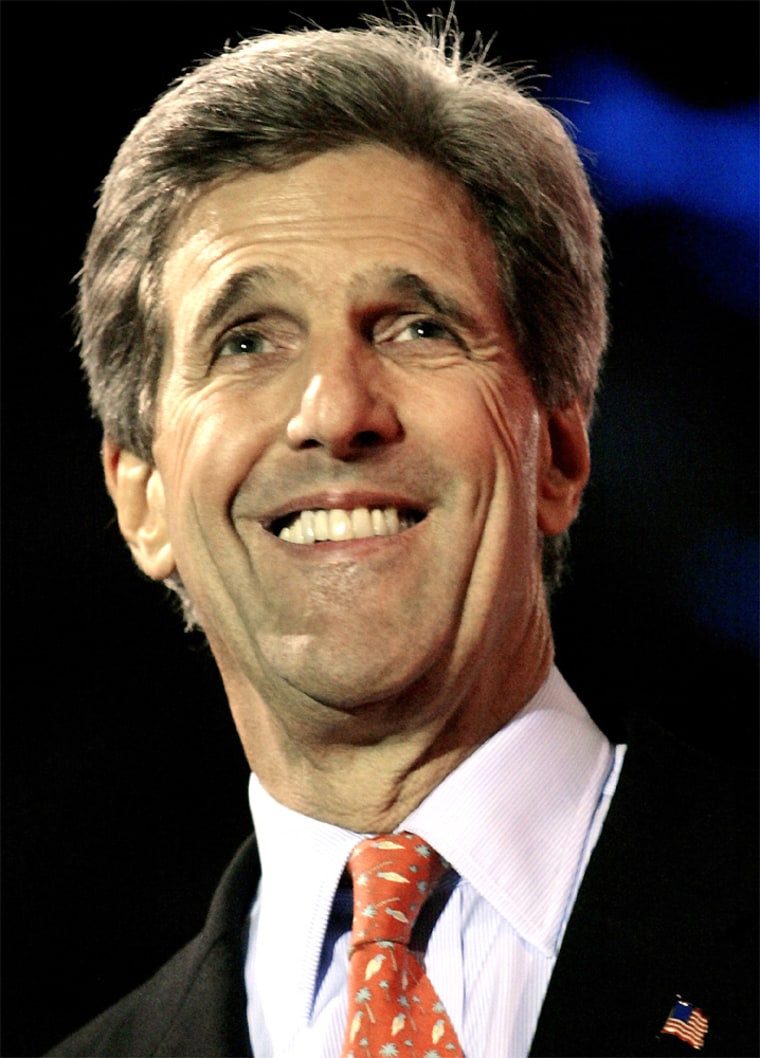John Kerry became the first Democratic hopeful to raise $50 million over three months while President Bush set a record by topping that, officials said Friday.
The Kerry campaign announced that it raised more than half its money online from January through March, about $26.7 million, the most ever taken in by a presidential campaign over the Internet in one quarter.
The campaign plans to expand its grass-roots fund-raising efforts by running newspaper ads urging people to donate, starting with a full-page plea in The New York Times on Sunday. In addition, the bulk of Kerry’s 20-city fund-raising tour is yet to come. Kerry raised millions this week during a two-day swing through California.
“We are experiencing sellout crowds at every gala,” said Lou Susman, national finance chairman. Kerry’s $50 million beats the Democratic record of $16 million raised in a quarter, set by Howard Dean last year.
No exact total for Bush
The Bush campaign, too, continues raising money at events, online and through direct-mail pitches. The campaign has not yet released an exact total for Bush’s donations from January through March, but it said Bush had beat the presidential quarter record of $50 million he set with his fund raising from July through September last year.
In all, Bush has raised more than $182 million. Kerry has raised more than $75 million and hopes to reach $105 million by the Democratic nominating convention in late July.
Both candidates skipped public financing for the primaries, freeing them from a $45 million spending limit they would have faced until the nominating conventions.
Both are expected to accept full government financing for their general-election campaigns. If they do, they will receive checks for about $75 million when they are officially nominated by their parties. They will be barred at that point from spending any more of the private contributions they have raised on their general-election campaigns.
With the surge in donations, the Democratic Party finds itself in its most confident and comfortable financial position in years, though it still trails Republicans in almost every fund-raising category.
The Democrats’ efforts to whittle away at the GOP’s spending advantage have been aided by Kerry’s decision to skip public financing and its spending limits, anti-Bush sentiment over the Iraq war, elimination of the party’s debt, the formation of outside Democratic fund-raising groups, and Dean’s Internet fund-raising explosion.
'We have a chance'
“Everywhere I go I’ll talk to people and they really feel we have a chance,” said Tony Coelho, a Democratic strategist and Al Gore’s campaign chairman in 2000. “They’re going to have $200 million or more. But I think as long as we’re around $100 million we’ll be competitive, we’ll get our message out.”
Democratic National Committee Chairman Terry McAuliffe sees considerable progress toward that goal: The party entered April with $26 million in the bank to spend on Kerry’s behalf and no debt, its best shape at this point in an election season in years.
But the Republican money advantage remains significant, no matter how it is measured.
Bush spent about $40 million on TV and radio ads in his first month on the air, compared to only about $6 million for Kerry.
The Republican National Committee had $54 million on hand Thursday and no debt. The GOP’s Senate fund-raising committee had roughly twice as much in the bank as its Democratic rival. The Democratic House committee was closest to its Republican counterpart in cash on hand, $12.3 million compared to $16 million.
The DNC, tackling two problems that dogged the party for years, has eliminated its debt while substantially improving its ability to attract small-dollar donations through the mail, a fund-raising method the GOP long has used more effectively.
Trying to limit operating costs
McAuliffe is trying to limit the party’s operating costs to the amount raised through direct mail, reserving the millions taken in through fund-raisers for the presidential race.
The DNC also is coordinating its fund raising with Kerry. The party has raised at least $5 million for Kerry using its list of e-mail addresses, and Kerry is headlining DNC events in several cities where he is holding fund-raisers for his campaign.
The area of Democratic fund raising that has most stung the Republicans has been conducted by new tax-exempt groups on the outside that have raised millions in large soft-money donations that the Democratic Party can no longer collect.
Those groups, funded by the likes of billionaire George Soros and run by such Democratic heavyweights as former Clinton deputy Harold Ickes, are running ads in battleground states to help close the gap with Bush and give Kerry time to resupply his campaign treasury.
Republicans were worried enough this week that they filed a formal complaint with federal election regulators accusing Kerry of illegally collaborating with the outside groups and seeking an end to the spending.
